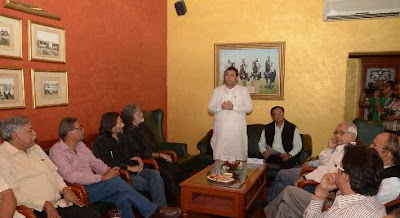The Joshua Bells of Rajasthan
I was at the lunch at the Rajasthan Polo Club lounge in Jaipur organised by Rajasthan National Forum where I am the serving President. The Pink City is gearing up for the upcoming Pravasi Bhartiya Diwas and the Jaipur Literary Festival.
The purpose behind hosting the lunch was to discuss and evolve ways to increase public participation in these events so as to make it a thumping success.

Top state-level musicians, theatre artists, litterateurs and senior editors of dailies attended the lunch, including Grammy Award winner Pandit Vishwa Mohan Bhatt (picture).
The artistes lamented that they were pained by the fact that the state (Rajasthan) has never accorded due recognition or respect to them. That the artistes were so deeply hurt was a revelation for me.
All the artistes were of the view that talent has no value until and unless you market yourself well. Else, one is barely noticed.
During an informal discussion I was told that I was lucky to stay in a state or city where the citizens respect the artistes and value art and culture.

This sad outbursts of the Rajasthan artistes reminded me of a famous incident that took place at the Washington D.C., L’Enfant Plaza metro station subway on a cold January 12 morning in 2007. It so happened that a man with a violin played six Bach compositions for about 45 minutes. During that time nearly 1097 people, mostly office goers, passed by.
Three minutes after the violinist began playing, a woman who walked by without stopping tossed in the first dollar. At six minutes a young man leaned against a wall to listen to him, then looked at his watch and walked off.
During the 45-minute performance by the violinist, only seven people stopped and listened for a short while. About 20 passersby gave money without stopping. At the end of it, he had collected US $32.17 in all. Only one man out of the 1097 people who passed by recognized Joshua Bell – one of the greatest violinist and famous musicians in the world. The man who recognized Bell paid him $20.
Bell had donned a baseball cap and played as an incognito street busker at the subway station. He played one of the most intricate pieces ever written with a violin worth $3.5 million dollars.
Just two days earlier, Joshua Bell performance was a sell-out in a theater in Boston and people paid an average of US $100 for a seat to listen to him play the same music.
Bell’s performance at the subway station was a part of a social experiment on perception, taste and people’s priorities initiated by Washington Post columnist Gene Weingarten and videotaped by secret cameras. This experiment raised several questions.
-
In a common-place environment, at an inconvenient or inappropriate hour, do we perceive beauty?
-
If so, do we stop to appreciate it? Do we recognize talent in an unexpected context?
What came of this experiment was the fact – If we do not have a moment to stop and listen to one of the best musicians in the world, playing some of the finest music ever written, with one of the most beautiful instruments ever made. How many other things are we missing as we rush through life!
Rajasthan, it seems, has scores of such Joshua Bells who remain the unsung cultural torch bearers of a region with one of the richest cultural heritage in the world.
As I pen this blog, I am greatly pained by the loss of human lives at the AMRI Hospital. My deepest condolences to the families who lost their near ones and I pray to God the souls of the dead may rest in peace.
I have so many times written about the chalta hai attitude towards life in India. But never in my wildest imagination could I think of a tragedy of such proportion could take place, of all places, in a hospital.
ess bee
